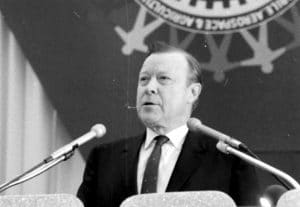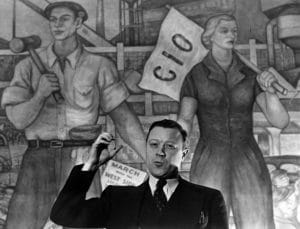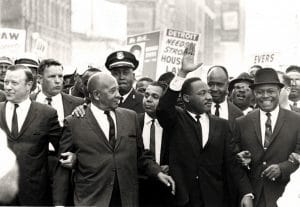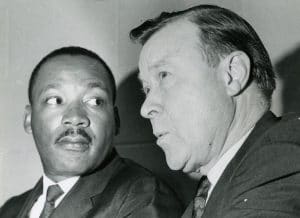
The 50th anniversary of former UAW President Walter Reuther highlights how much the union has changed.
This weekend marks the 50th anniversary of the death of Walter Reuther, the legendary leader of the United Auto Workers, who built the union into a significant force in American life.
Reuther’s death in May 1970 came at a tumultuous time. The four students had been killed by National Guardsman during an anti-Vietnam War demonstration at Kent State University in Ohio only a few days before Reuther and his wife, May, died in a plane crash in northern Michigan.
Reuther’s sudden death also was big, dramatic news. Reuther was the public face of organized labor when unions were a major force in American life. Reuther not only led the auto workers, negotiating contracts that lifted the standard of living not only for UAW members but also American workers in general.
(Reuther era veteran Schrade calls for UAW president’s removal.)
“Walter Reuther built the benefit package workers now take for granted, from health care to pensions. But his agenda was bigger than unionism,” noted Time magazine in a 1998 article, naming “The 100 Most Influential People of the 20th Century.”
Reuther’s historic “Treaty of Detroit,” originally hammered out with General Motors, certainly helped his UAW members, he also wanted to see the improvements extended more broadly across American life.
In the years before his death, Reuther also had championed the causes other unions, providing critical support to AFSCME employees as well as the American Federation of Teachers and farm workers in California. He also lent his support to the Civil Rights movement throughout the 1960s, earning the undying enmity of those opposing the changes advocated by leaders such as Rev. Martin Luther King, helping organize the March on Washington in 1963 where King delivered his iconic “I Have a Dream” speech.
Just before he died, Reuther also had a hand in organizing the very first “Earth Day” with the fledgling environmental movement.
But in the half century since Reuther’s death, the ideals for which he fought have been eclipsed by other forces, while the union he once led has become mired in a scandal that has further trimmed its influence at a critical time.
“In the past four decades, Americans without bachelor’s degrees — the majority of the working-age population — have seen themselves become ever less valued in our economy. Their effort and experience provide smaller rewards than before, and they encounter longer periods between employment,” noted a New Yorker review of “Death of Despair and Future of Capitalism” by Anne Case and Angus Deaton, who won a Nobel Prize in economics for his work on economies of developing countries.
“The U.S. has also embraced automation and globalization with greater alacrity and fewer restrictions than other countries have. Displaced workers here get relatively little in the way of protection and support,” the review noted.
(Former UAW President Owen Bieber passes away at age 90.)
Some protections negotiated for UAW members, such as health care, remain. But others such as cost-of-living protections, annual raises and even pensions for workers hired by automakers since 2007 have vanished as the union’s influence has declined.
The long-term decline of Reuther’s UAW has been dramatized by the election of Donald Trump in 2016, the loss of two critical organizing elections in 2017 and the resignation of the union’s then-President Gary Jones in 2019 as the federal prosecutors prepared criminal charges against him.
The unfolding scandal inside the union contributed directly to the loss in the organizing drive at Nissan plant in Canton, Mississippi, where the union hoped its ties to the Civil Rights movement that had helped change the old South could bolster the unionization effort among the workforce, which is largely African-American.
As it beat back the UAW drive in August 2017, Nissan’s management played up the scandal and warned of the potential for job loss, using a playbook that Nissan CEO Carlos Ghosn had used successfully in the past against the UAW.
The union’s loss of the organizing drive in Dayton, Ohio, in the fall of 2017 at a plant operated by the Fuyao Group was even more painful for the UAW. A Chinese tycoon had taken over an old General Motors plant, and as the award-winning film, American Factory revealed relied on unsavory methods to try to turn a profit at the factory which made automotive glass.
Unlike in Mississippi where union’s face intense political and social opposition, Dayton was long considered a union town and where many workers had long-standing ties to the UAW. Fuyao, however, played up the scandal and borrowed heavily from Ghosn’s play book to defeat the union.
One of Reuther’s great strengths was his ability to bridge the cultural divides among workers inside the plants where employees of different races, religions, ethnicities and often speaking different languages labored.
The UAW still strives to live up to Reuther’s ideals as the union’s current president emphasized in message marking the anniversary of Reuther’s death. “Today, there is still much to do, but Walter Reuther’s legacy lives on and can serve as inspiration to so many as we work through the challenges our country now faces,” Gamble added.
(UAW in a box it never envisioned.)
However, all too often, the union’s political opponents have successfully exploited the UAW’s internal differences over cultural issues such as feminism, guns and religion to weaken the union’s calls for solidarity that underwrote Reuther’s ability to make gains at the bargaining table and in legislation.




One step forward, two steps back…